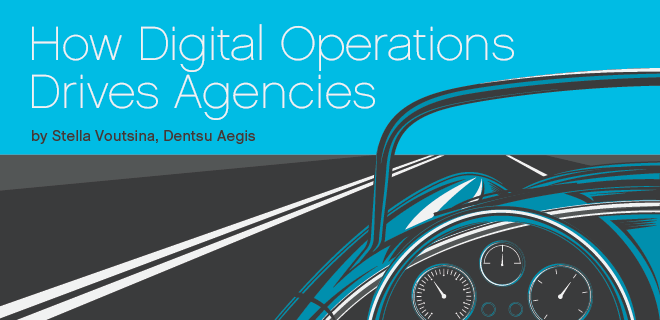
Digital media itself may be a major disruption, but it is also an opportunity to explore new business models. Media agencies are constantly finding themselves in search of the next best media idea, strategy, or product. So how do they become better at working with digital or simply better digital agencies?
For some, the answer might be within planning, strategy or trading. All of these are very important to win big clients and attract talent that can sustain existing client portfolios. But in the increasingly complex world of digital marketing, the core of a successful digital media agency is operations – more specifically, digital operations.
Traditionally planners plan, creatives create, analysts analyze, and buyers buy. But who continues to activate media? Who manages data inputs and outputs? Who administers digital marketing platforms? Who is responsible for gaining expertise in new technologies? Who is able to audit the entire digital process?
All of these responsibilities (and more) fall under a new generation of ad ops: the digital operations team. Industry-leading agencies have moved digital operations to the forefront of their agencies, allowing these teams to be a main driver in the business.
Digital operations manages complex and integrated digital marketing technologies and ecosystems to fully and efficiently activate digital campaigns while collecting clean, actionable data for analytics, insights, and media planning purposes. A digital operations team provides the necessary knowledge and technical expertise to act as the center of the digital agency’s business in terms of data integrity and overall digital marketing strategy.
These teams are experts in navigating the challenges that marketing technology systems can present but also have the project management skills required to manage different phases of a campaign and interact with the multiple parties involved in that process (creative house, media owner, planning teams, etc.). By having these skills in-house, media agencies gain a great opportunity to build solid and robust digital capabilities without having to over-invest in expensive training, recruitment or consultants.
The following is a list of five digital operations recommendations that can assist an agency in excelling within the digital landscape.
A Center of Excellence for All Things Digital. The digital operations team should be the most educated about and up-to-date with digital technologies across the advertising spectrum. Team members should know all the dos and don’ts of the agency, client, and technology partners. Digital operations should be the “go-to” people for any questions about digital advertising data, technology and activation.
A Diverse Group of Technology Professionals. To become a center of excellence, the digital operations team needs to be staffed with experts in multiple fields. Traditionally this has included digital display traffickers, SEO professionals, and paid search specialists. Following the trends, the industry has also introduced the social media manager as a dedicated position.
Agencies at the forefront of the industry have started to staff their digital operations teams with experts in areas such as web development, big data, media strategy and analytics. These agencies have proven the value of having technical experts in-house, providing advanced levels of quality assurance while adding significant value to client offerings.
Leverage During the Entire Campaign Process. A great idea is not always possible or financially feasible in the digital workspace. By contrast, some ideas can be expanded upon or performed at reduced or no cost in the digital workspace. Including the digital operations team throughout each step of the campaign process allows planning teams, creative partners, clients, and others spend valuable time on strategy and execution with upfront assurances of what can or cannot be accomplished.
Promote Change and Disruption. The digital operations team must understand that change is a necessity, and nothing is guaranteed to stay the same for extended periods of time. As technology advances, standards will change and processes will need to be adjusted. It is important that digital operations embraces change while still maintaining a focus on process and quality assurance.
Always Make Time to Learn. Because of their intense responsibilities, digital operations teams are often backlogged with projects and find very little time for anything else. When determining the proper staffing for a digital operations team, make sure to build in time for learning and continuing education. The digital landscape is constantly changing, so it is vitally important digital operations remain intimately familiar with the latest and greatest technologies and innovations in digital marketing.
The strategic objective of becoming a great digital agency is far more realistic if the infrastructure and operations are based on digital foundations. The days of “ad ops” being the last stage of activation are all but gone. In the past decade digital ad ops has grown from a single planner’s part-time responsibility to teams of skilled revenue specialists. If senior executives and CMOs want to embrace real disruption, now is the time to invest in digital operations.